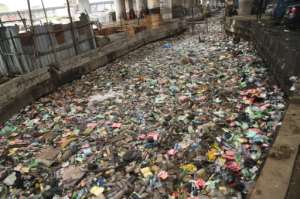
Plastic pollution is the accumulation of plastics objects and particles (e.g. plastic bottles, bags and microbeads) in the Earth's environment that adversely affects humans, wildlife and their habitat. Plastics that act as pollutants are categorized by size into micro, meso, or macro debris. Plastics are inexpensive and durable, making them very adaptable for different uses; as a result, manufacturers choose to use plastic over other materials. However, the chemical structure of most plastics renders them resistant to many natural processes of degradation and as a result they are slow to degrade. Together, these two factors allow large volumes of plastic to enter the environment as mismanaged waste which persists in the ecosystem and travels throughout food webs. Plastic pollution can take place in the ocean, water ways and on the land.
ADDRESSING THE PROBLEM
Given the global scale of plastic pollution, the cost of removing plastics from the environment would be prohibitive. Most solutions to the problem of plastic pollution, therefore, focus on preventing improper disposal or even on limiting the use of certain plastic items in the first place. Fines for littering have proved difficult to enforce, but various fees or outright bans on foamed food containers and plastic shopping bags are now common, as are deposits redeemed by taking beverage bottles to recycling centers. The extended producer responsibility, or EPR, schemes make the manufacturers of some items responsible for creating an infrastructure to take back and recycle the products that they produce. Awareness of the serious consequences of plastic pollution is increasing, and new solutions, including the increasing use of biodegradable plastics and a “zero waste” philosophy, are being embraced by governments and the public.
The following measure are some of the ways AbibiNsroma Foundation employed to ensure that collectively each one plays a major role in ensuring that plastic pollution are dealt with in a more friendly and safer way in some selected communities and schools in Tema and other neighboring communities ie, Manhean and Tema NewTown.
- .Public education and sensitization in Manheam and Tema New Town which is predominantly a fishing community to educate them on their various roles they need to play in ensuring plastic pollution in the community and the water bodies are dealt with.
- Youth education on plastic pollution in some selected Junior high and secondary schools in Tema, Manheam and Tema New Town to get the youth informed about this issue.
- Organizing periodic cleanup exercises and campaigns at Manheam and Tema New Town with the help of the community people and collaboration of the local assembly.
- Collaborating with the local assembly and authorities to institute a fine system to deter people from polluting the environment with plastic waste and other forms of waste.
- Advocating for the establishment of plastic waste industries at Manheam and New Town communities where people can send their plastic waste for some amount, and these plastic waste companies can use these plastic waste
- Educating the people of Manheam and NewTown on waste segregation and its importance and the fact that we can use some of these wastes to produce energy.
By SAMUEL F. BOACHIE
Senior Associate/ Consultant
ABIBINSROMA FOUNDATION
www.abibinsromafoundation.org




 EC not exhibiting its revered role in Ghana’s democracy — Nii Lante Vanderpuye
EC not exhibiting its revered role in Ghana’s democracy — Nii Lante Vanderpuye
 May 11: Cedi sells at GHS14.24 to $1, GHS13.67 on BoG interbank
May 11: Cedi sells at GHS14.24 to $1, GHS13.67 on BoG interbank
 Jean Mensa politically tainted, likely to be removed if government changes — Mar...
Jean Mensa politically tainted, likely to be removed if government changes — Mar...
 Taxing churches is legally and morally wrong — Kofi Bentil
Taxing churches is legally and morally wrong — Kofi Bentil
 As of 2023, only 15% public primary schools, 13% public JHSs had access to funct...
As of 2023, only 15% public primary schools, 13% public JHSs had access to funct...
 Only 44% of primary schools, 63.9% of JHSs had access to electricity by 2020 — E...
Only 44% of primary schools, 63.9% of JHSs had access to electricity by 2020 — E...
 NDC has the BVR serial numbers now; no planned ‘game’ can work — Kofi Adams
NDC has the BVR serial numbers now; no planned ‘game’ can work — Kofi Adams
 I will continue to prove my critics wrong — Akufo-Addo
I will continue to prove my critics wrong — Akufo-Addo
 Wingèd Victory
Wingèd Victory
